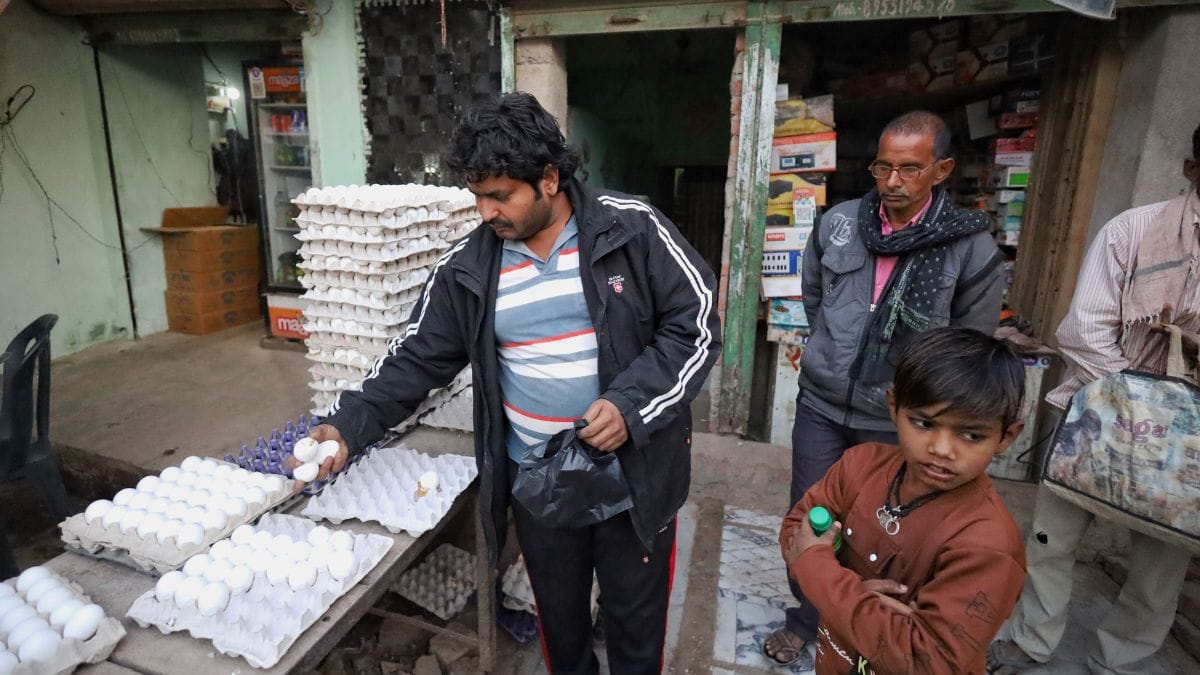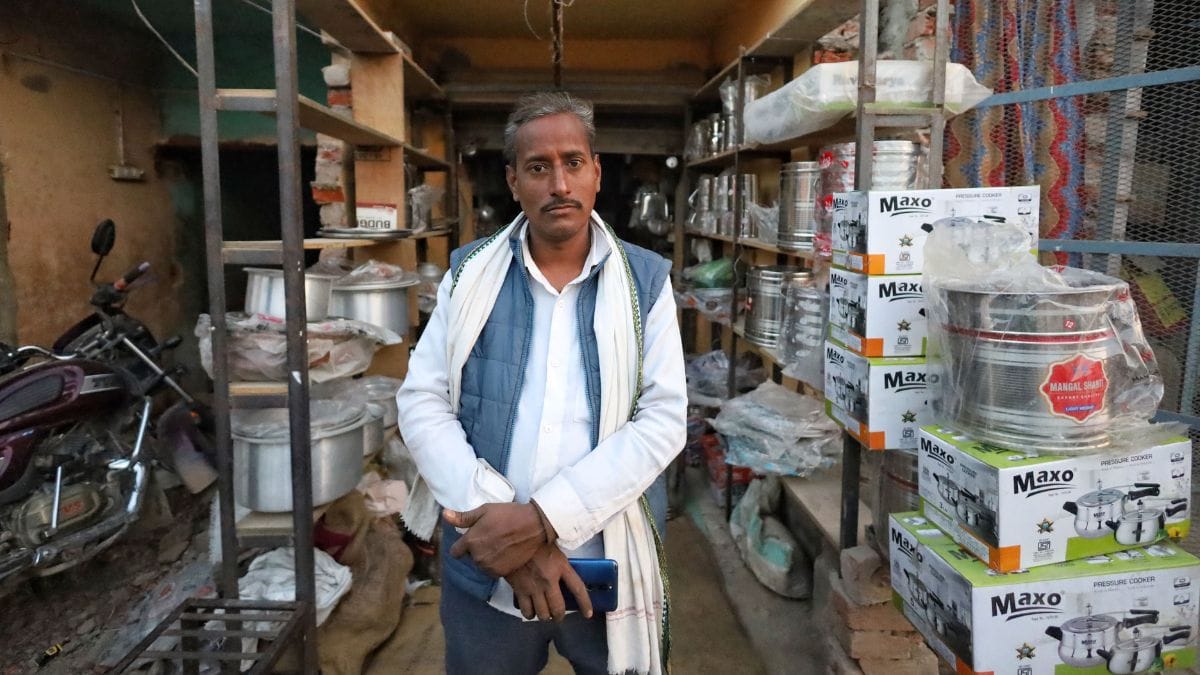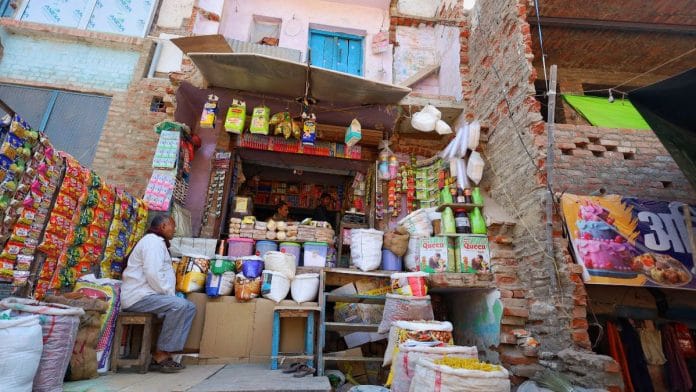Fatehpur: Born and raised in Fatehpur’s Lalauli village, Shahabuddin Khan was not too unhappy running an electronics shop from his ancestral property and a small stall selling eggs. After all, he chose to return home from Mumbai after COVID-19, having experienced the difficulties that migrant workers did at the time in cities far from their homes. However, renewed efforts to prosper in his village hit a speedbreaker in August this year.
His property was one of the 139 properties, owned by both Muslims and Hindus in a predominantly Muslim majority village that the Public Works Department (PWD), preparing for a highway expansion project, earmarked as falling within the 12-metre range of the central point of the highway connecting Bahraich and Banda districts. Within days of receiving the notices, house- and shop-owners were forced to demolish portions of their properties at the cost of taking a hit that they have, so far, failed to recover from. The 10 December demolition of a portion of the century-old Noori Jama Masjid in Fatehpur has renewed their agony.
Early Tuesday morning, nearly 200 police personnel, one company of Rapid Action Force and three platoons of the Provincial Armed Constabulary were deployed at the site of the mosque before the bulldozers roared into action. The PWD and the Fatehpur district administration asserted that a ‘newly constructed section’ of the mosque encroached upon the 12m limit around the state highway 13.

The portion of the highway passing through Lalauli—which seems the most neglected—came into the limelight during Tuesday’s “anti-encroachment” drive in the village.
Speaking to ThePrint, local sources in the PWD said that the demolitions were a “routine” exercise, done on receiving complaints of encroachment or to clear encroachments when any public project is sanctioned.
“There have been at least nine such instances in the last one year. Demolition was carried out thrice in the Bindgi area, while twice it was carried out in the Ghazipur area of the highway,” an official said.
As the dust settles on the mosque demolition, Lalauli residents, speaking to ThePrint, recalled their burgeoning problems since 17 August, when they first received notices to demolish their properties.
‘Prayers keep us going’
Like Shahabuddin, several small businessmen who regularly visit the Noori Jama Masjid for prayers have been left with a profound sense of loss, calling the demolition of a portion of the mosque that binds the community “heartbreaking”.
The demolition has cleared roughly 14-15 ft width of the outer hall of the mosque, according to officials aware of the matter.
Speaking to ThePrint, Shahabuddin said, “For poor people such as us, who are already grappling with diminishing businesses, religious beliefs and prayers bind us together and keep us going.”
In August, all house- or shop-owners complied with the notices served by the PWD because there was an understanding that demolition of their properties was “inevitable” if they did not do it themselves.
“We were asked to demolish the front portions of shops and houses, which, according to officials, were within the range of the road. Otherwise, the authorities would have demolished them and charged us fines,” Shahabuddin said.
He said that businesses have collapsed for nearly all shop owners who received the notices. Shahabuddin, a father of two children studying in a private school, said managing finances has become a mountainous task.
“Business came to a standstill after the PWD served notices to shop owners such as I and hundreds of others. I was running an electronics shop and a stall to sell eggs in the outer portion of my ancestral property. Now, I keep my shop running from makeshift arrangements,” he said.
Also Read: How a 2020 ‘extortion list’ of Mughalsarai police has snowballed into ongoing cop-cop war
‘Unable to invest any longer’
Shahabuddin’s story is all too familiar to Vinod Kumar (40), who has been running a steel crockery shop from a room on rent for over two decades. In consultation with his landlord, Kumar demolished the front portion of the shop 10 days after receiving the PWD notice in August.

Kumar reckoned that businesses had started to recover from the August demolitions, but Tuesday’s action and the controversy around it would further dent their prospects.
“Businesses collapsed in the months following the notices to shop- and house-owners. However, of late, there were some signs of recovery. People had started moving on and accepting that their properties might have been on government land,” he told ThePrint.
A disciplined businessman, Kumar has been investing in a recurring deposit scheme offered by the post office for a year but has failed to pay a monthly sum of Rs 6,000 since September this year.
“Where shall I get the money to invest? I had started the deposits, thinking of leaving behind a pool of money for my son and daughter, but we are struggling to survive now,” Kumar said, adding that the demolitions, so far, have created more problems than they have solved.
In August, the administration informed shop- and house-owners about their property falling within the range of the highway and suggested demolition but has done nothing yet to clear the debris left behind.
“The debris has clogged the already-clogged drainage system here. Now, water flows into our shops, damaging goods, further damaging our business. The road here has been terrible for more than five years. While the authorities were prompt to order demolitions, there has been little promptness about the construction of roads here—which would have made life easier for us,” Kumar said.
He also expressed apprehension about the sentiments among the Muslim community after Tuesday’s demolition, which could further affect his business prospects in the village.
Also Read: What made Jhansi hospital blaze worse? Higher oxygen levels, overcapacity & ‘ignored’ advisory
‘Set us back by years’.
While stories of notices affecting business and infrastructure are aplenty in Lalauli village, the PWD notices and subsequent demolitions have set people such as Vikas Gupta back by half a decade.
Gupta (30) took over the running of a traditional sweets’ shop that his grandfather opened and his father ran. It lifted the family. His two daughters took admissions in school.
“We had a small house and shop but had been living well. The notice set us back by a few years,” Gupta said.
When his business was doing well, Gupta put in money to renovate the house and build toilets, especially considering the needs of his daughters. However, he demolished those parts of the house in August in compliance with the PWD notice. The family is now at least five years behind when they were without toilets at home.
“A sweet shop of this scale does not generate income to such a great level that I can construct houses or toilets anytime. It will take me years before I will have the money to build them again, but now the problem is also about land, considering the shop has already taken up some part of the house,” Gupta said.
‘Neglect the topmost concern’
Located 45 km from Banda district—a hub of sand mining—Lalauli sees heavy traffic movement throughout the day.
That, coupled with neglect, has left the village without a decent road, residents said, adding that stones from the road due to the movement of the trucks have injured many people.
“There are so many people who had to be taken to Fatehpur town for treatment after injuries from stones flying at them,” Gupta told ThePrint.
For young people such as Huzaifa Khan (25), who faced a double whammy in the form of notices for his house and a medical shop he works at, the road is of the utmost priority.
“We demolished a portion of our house within a week of receiving the notice, as well as the shed outside the shop in consultation with the owner. This demolition has taken away some customers because people can’t hang out here and stay longer,” he told ThePrint.
A Bachelor of Pharmacy from Kanpur’s Pranveer Singh Institute of Technology, Huzaifa asserted that the highway between Fatehpur and Banda—except for nearly a one-kilometre range at Lalauli—is decent.
“Due to the demolition of the mosque, the spotlight is finally on this village, which has been neglected for years. Hopefully, now that the authorities have enforced such tough measures against people in the name of widening roads, there will finally be roads for people in Lalauli,” Huzaifa said.
(Edited by Madhurita Goswami)
Also Read: Sambhal Masjid row: A Mughal-era mosque, Gyanvapi-like legal battle & clashes that killed 4






